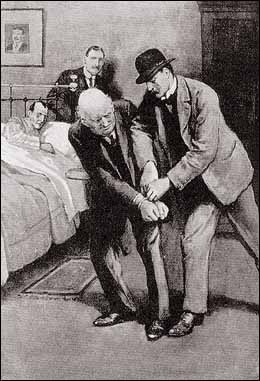| The Dying Detective 6 | The Disappearance of Lady Frances Carfax 1 |
Holmes’s voice had sunk to an almost inaudible whisper.
“What is that?” said Smith. “Turn up the gas? Ah, the shadows begin to fall, do they? Yes, I will turn it up, that I may see you the better.” He crossed the room and the light suddenly brightened. “Is there any other little service that I can do you, my friend?”
“A match and a cigarette.”
I nearly called out in my joy and my amazement. He was speaking in his natural voice – a little weak, perhaps, but the very voice I knew. There was a long pause, and I felt that Culverton Smith was standing in silent amazement looking down at his companion.
“What’s the meaning of this?” I heard him say at last in a dry, rasping tone.
“The best way of successfully acting a part is to be it,” said Holmes. “I give you my word that for three days I have tasted neither food nor drink until you were good enough to pour me out that glass of water. But it is the tobacco which I find most irksome. Ah, here are some cigarettes.” I heard the striking of a match. “That is very much better. Halloa! halloa! Do I hear the step of a friend?”
There were footfalls outside, the door opened, and Inspector Morton appeared.
“All is in order and this is your man,” said Holmes.
The officer gave the usual cautions.
“I arrest you on the charge of the murder of one Victor Savage,” he concluded.
“And you might add of the attempted murder of one Sherlock Holmes,” remarked my friend with a chuckle. “To save an invalid trouble, Inspector, Mr. Culverton Smith was good enough to give our signal by turning up the gas. By the way, the prisoner has a small box in the right-hand pocket of his coat which it would be as well to remove. Thank you. I would handle it gingerly if I were you. Put it down here. It may play its part in the trial.”
There was a sudden rush and a scuffle, followed by the clash of iron and a cry of pain.

“You’ll only get yourself hurt,” said the inspector. “Stand still, will you?” There was the click of the closing handcuffs.
“A nice trap!” cried the high, snarling voice. “It will bring you into the dock, Holmes, not me. He asked me to come here to cure him. I was sorry for him and I came. Now he will pretend, no doubt, that I have said anything which he may invent which will corroborate his insane suspicions. You can lie as you like, Holmes. My word is always as good as yours.”
“Good heavens!” cried Holmes. “I had totally forgotten him. My dear Watson, I owe you a thousand apologies. To think that I should have overlooked you! I need not introduce you to Mr. Culverton Smith, since I understand that you met somewhat earlier in the evening. Have you the cab below? I will follow you when I am dressed, for I may be of some use at the station.
“I never needed it more,” said Holmes as he refreshed himself with a glass of claret and some biscuits in the intervals of his toilet. “However, as you know, my habits are irregular, and such a feat means less to me than to most men. It was very essential that I should impress Mrs. Hudson with the reality of my condition, since she was to convey it to you, and you in turn to him. You won’t be offended, Watson? You will realize that among your many talents dissimulation finds no place, and that if you had shared my secret you would never have been able to impress Smith with the urgent necessity of his presence, which was the vital point of the whole scheme. Knowing his vindictive nature, I was perfectly certain that he would come to look upon his handiwork.”
“But your appearance, Holmes – your ghastly face?”
“Three days of absolute fast does not improve one’s beauty, Watson. For the rest, there is nothing which a sponge may not cure. With vaseline upon one’s forehead, belladonna in one’s eyes, rouge over the cheek-bones, and crusts of beeswax round one’s lips, a very satisfying effect can be produced. Malingering is a subject upon which I have sometimes thought of writing a monograph. A little occasional talk about half-crowns, oysters, or any other extraneous subject produces a pleasing effect of delirium.”
“But why would you not let me near you, since there was in truth no infection?”
“Can you ask, my dear Watson? Do you imagine that I have no respect for your medical talents? Could I fancy that your astute judgment would pass a dying man who, however weak, had no rise of pulse or temperature? At four yards, I could deceive you. If I failed to do so, who would bring my Smith within my grasp? No, Watson, I would not touch that box. You can just see if you look at it sideways where the sharp spring like a viper’s tooth emerges as you open it. I dare say it was by some such device that poor Savage, who stood between this monster and a reversion, was done to death. My correspondence, however, is, as you know, a varied one, and I am somewhat upon my guard against any packages which reach me. It was clear to me, however, that by pretending that he had really succeeded in his design I might surprise a confession. That pretence I have carried out with the thoroughness of the true artist. Thank you, Watson, you must help me on with my coat. When we have finished at the police-station I think that something nutritious at Simpson’s would not be out of place.”
| The Dying Detective 6 | The Disappearance of Lady Frances Carfax 1 |